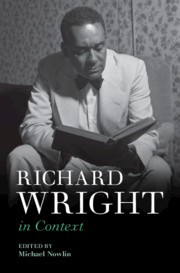Book contents
- Richard Wright in Context
- Richard Wright in Context
- Copyright page
- Contents
- Figures
- Contributors
- Abbreviations
- Richard Wright’s Works: A Chronology
- Introduction Richard Wright’s Luck
- Part I Life and Career, Times and Places
- Part II Social and Cultural Contexts
- Chapter 6 Black Masculinity
- Chapter 7 Wright and African American Women
- Chapter 8 He Tried to Be a Communist
- Chapter 9 Liberalism and the Color Line
- Chapter 10 “The Same Stuff”
- Chapter 11 Moviegoers and Cinematic Seers in Wright’s Fiction
- Chapter 12 Clothing
- Chapter 13 “Defeat Measured in the Jumping Cadences of Triumph”
- Chapter 14 Wright and Religion
- Chapter 15 Bandung and Third-World Liberation
- Chapter 16 Black Paris, Hard-Boiled Paranoia, and the Cultural Cold War
- Part III Literary and Intellectual Contexts
- Part IV Reputation and Critical Reception
- Index
Chapter 6 - Black Masculinity
Boyhood and Manhood Denied in Jim Crow America
from Part II - Social and Cultural Contexts
Published online by Cambridge University Press: 08 July 2021
- Richard Wright in Context
- Richard Wright in Context
- Copyright page
- Contents
- Figures
- Contributors
- Abbreviations
- Richard Wright’s Works: A Chronology
- Introduction Richard Wright’s Luck
- Part I Life and Career, Times and Places
- Part II Social and Cultural Contexts
- Chapter 6 Black Masculinity
- Chapter 7 Wright and African American Women
- Chapter 8 He Tried to Be a Communist
- Chapter 9 Liberalism and the Color Line
- Chapter 10 “The Same Stuff”
- Chapter 11 Moviegoers and Cinematic Seers in Wright’s Fiction
- Chapter 12 Clothing
- Chapter 13 “Defeat Measured in the Jumping Cadences of Triumph”
- Chapter 14 Wright and Religion
- Chapter 15 Bandung and Third-World Liberation
- Chapter 16 Black Paris, Hard-Boiled Paranoia, and the Cultural Cold War
- Part III Literary and Intellectual Contexts
- Part IV Reputation and Critical Reception
- Index
Summary
This essay contests the prevalent view of Richard Wright as a proponent of violent black masculinity. Beginning with Uncle Tom’s Children, I argue, Wright provides a radical critique of the very ‘macho’ violent wish-fulfillment he has been accused of endorsing. Stories such as "Big Boy Leaves Home," "Down by the Riverside," "Long Black Song" and "Ethics of Living Jim Crow" underscore the cruel ironic bind of black masculinity under Jim Crow: Black male children can be punished as “men” for the slightest perceived misstep, even while grown Black men are forced to assume the permanent position of “boys,” forever deferential to white authority. Wright confronts us with the trauma of black male vulnerability, while also interrogating the complex and contradictory psychological reactions and socio-political responses such vulnerability gives rise to. His work grasps the impulse to black masculinism as an understandable response to the particular historical circumstances of Jim Crow, while at the same time underscoring the strategic liability of such violent and individualist reactions. Ultimately, Wright suggests that it is only the concerted response of the larger black community that offers black boys and men alike a chance of meaningful resistance.
Keywords
- Type
- Chapter
- Information
- Richard Wright in Context , pp. 67 - 76Publisher: Cambridge University PressPrint publication year: 2021



